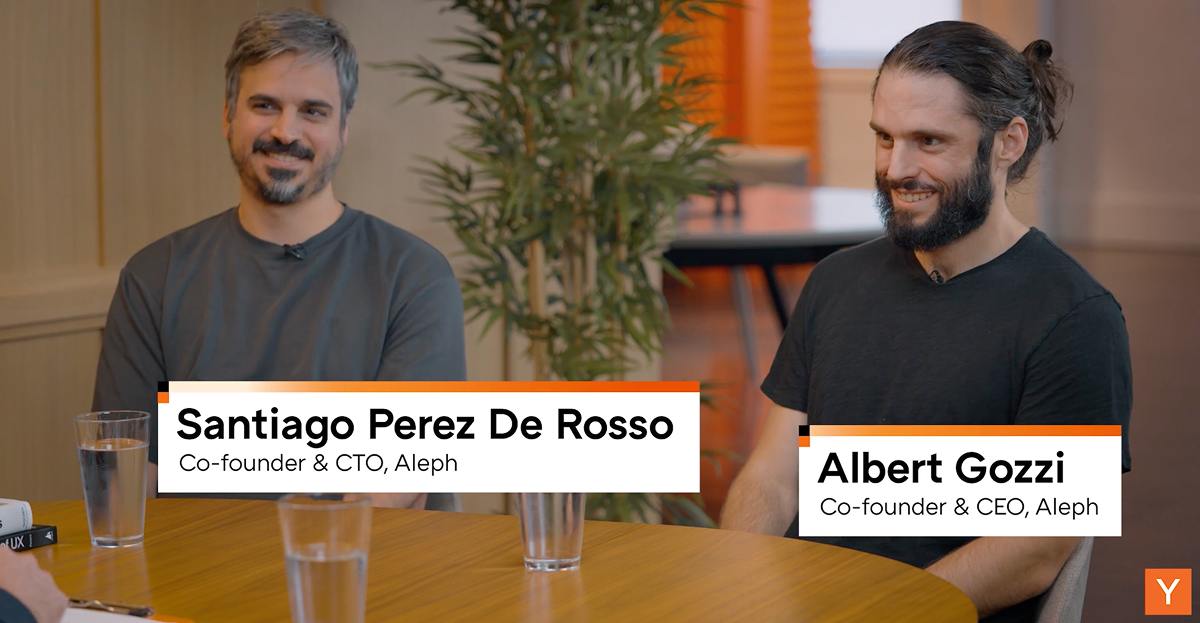TL;DR
Aleph co-founders Albert Gozzi and Santiago Perez De Rosso sat down with Y Combinator to talk about why they built an AI-native FP&A platform that meets finance teams where they work—in the spreadsheet. They also touched on how the company has scaled without losing its core focus and why our best work is still ahead.
Why we built Aleph (and why the spreadsheet still matters)
I'm Albert, Co Founder, CEO. I'm Santi, Co Founder and CTO. And yeah, Aleph is an AI native FP and A platform. So what we do is we centralize in one place all the information that finance team needs to make decisions. And then we've done some tools to work with these and do analysis. I think one of the core premises is the idea of meeting finance people where they are. So finance people live and breathe spreadsheets. So part of our product is actually within spreadsheets and it's an add in that people can use to work with that data.
We didn’t start out trying to replace spreadsheets. We started by watching how finance teams actually work. Every key decision—forecasting, board prep, scenario planning—still runs through a spreadsheet. That’s a feature, not a bug.
So instead of asking people to leave that behind, we built Aleph to meet them there. The spreadsheet is where judgment lives. It’s where context and calculation come together. Our job was to make that environment stronger.
That’s why Aleph runs right inside the spreadsheet: centralized data, AI memory, and deep structure—all in a format finance already knows.
What our Series B means for the future
The main highlight over the last couple of weeks is the announcement of our Series B. Twenty participation from all existing investors. So very exciting and I think I always think about funding rounds, not about the goal itself, but a reflection of doing other things right. And I think other things right are some of the amazing customers that we are lucky to work with from Zapier, Turo, to like companies like Harvey. So yeah, we're very excited and very excited about the future as well.
For us, a funding round is fuel, not a trophy. The only thing it should change is how fast the product gets better. This B lets us speed up the unsexy stuff that actually moves the needle: ship more native connectors so your data shares one spine, add implementation firepower so value shows up in hours not months, and double down on finance-grade accuracy.
That means lineage you can defend in a board deck, and AI guardrails that stay conservative when signal drops. In plain terms: it shortens the distance between “we signed” and “we trust this number.”
Same spine, stronger muscles
Sounds like you know you've hit on a problem when a customer is coming back to you like a year later saying like, hey, did you solve that thing? Yeah. We're still dealing with this. I think one of the interesting things to me is like I remember, you know, working with you guys during the batch and one thing that stands out is how much your product has it has evolved but the core concept has stayed the same, now four plus years later. What do you think you got Really write early on. And how did you do that without having to do all these pivots afterwards to get on the right track? I I do think it's a little bit of that like combination of our backgrounds in some way. I do think that the first one my side, having lived the pain, and I think it's, you know, very common YC advice that I one hundred percent agree and like double down on, that is if you're your own customer, I think you develop some empathy for the problem that is hard to match otherwise. And I think I had that empathy for being like my own customer. But at the same time, I had two hundred other calls I have done. So it's normally, I had the empathy for myself, but I also understood how others might want to use it differently. So, the pre deck is still very relevant today. Every time we're fundraising, now when we did the Series B announcement, I presented the series, the pre seed deck back to the whole team. And it's, yeah, it's scary how much it's still relevant.
Being our own first customer helped us choose the right primitives early: centralized data, spreadsheet-first workflows, and tight accuracy. Two hundred customer calls sharpened the rest.
That combo still holds up. Instead of chasing shiny pivots, we doubled down on the spine.
Our gut check hasn’t changed: if something breaks our model for integrations, lineage, or explainability, we don’t ship it. If it makes decisions faster and more trusted, we do.
That’s why the product looks different now, but still feels the same.
{{quote-1}}
We won’t let you fail
I think there was something about like the team and again, like our customer success team and this idea of we won't let you fail, right? And like we're hoping that it's going to be ninety nine percent the product and one percent someone that is going to help you. But like if for some workflow it needs to be fiftyfifty, we're going to do the work for you. And like we're going to make sure that you're going to be able to report on time that you're going to be able to report accurately. And again, today it's one hundred percent the product, would say, or very close to one hundred. In the early days, we had some of our customer success team, you know, review the numbers with the clients before sending them report over. And I think they were a little bit like the heroes of those early days.
We used to backstop reports manually—checking numbers, plugging gaps, owning the risk. It wasn’t scalable, but it taught us what finance-grade actually means: on time, board-ready, explainable.
So we productized it. Every hero moment became a habit: playbooks, SLAs, deterministic checks. We only retire a manual step after three boring closes in a row. And if something needs a human bridge, we ship the fix before next month.
Today it’s 99% product, 1% person—but the bar hasn’t changed.
We’re just getting started
I always tell our engineers when they join, you know, there's sort of like, there's a lot left to build. So in some sense, there's like infinite scope for you to grow, and there's a lot that we want to build in the product. Yeah, definitely now doing a lot of stuff on AI, which I think has a huge potential to really improve the productivity of our customers. And it's a sort of like an interesting technical challenge as well, because we were talking about sort of like security and so on, like in the space in which we operate, like accuracy matters a lot. So we need to spend a lot of time making sure that everything we put out there works well. So lots of work there, but we're seeing sort of like good results.
As Santi said, there’s endless room to build here—but our tolerance for error is zero. The fun work now is pragmatic AI that actually saves finance teams time, wrapped in guardrails that make it board-safe: deterministic checks when confidence dips, line-by-line lineage you can show in a deck, and human-in-the-loop until a workflow has three boring closes in a row.
Our journey to this point has been incredible, thanks in large part to early backers like YC. Check out the full interview with YC Partner Aaron Epstein.
But we’re just getting started. If you want to help build the financial system behind the next generation of great companies, come join us.













